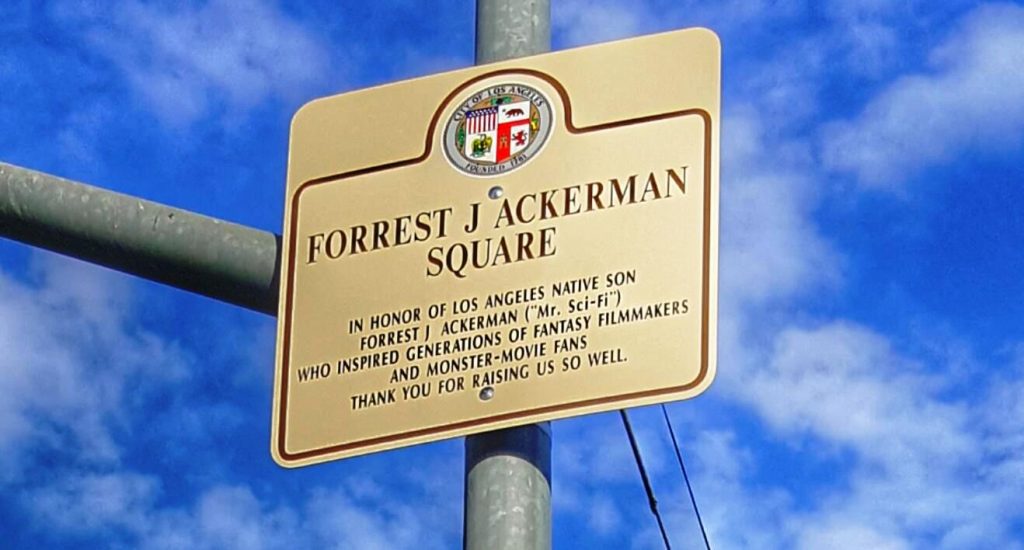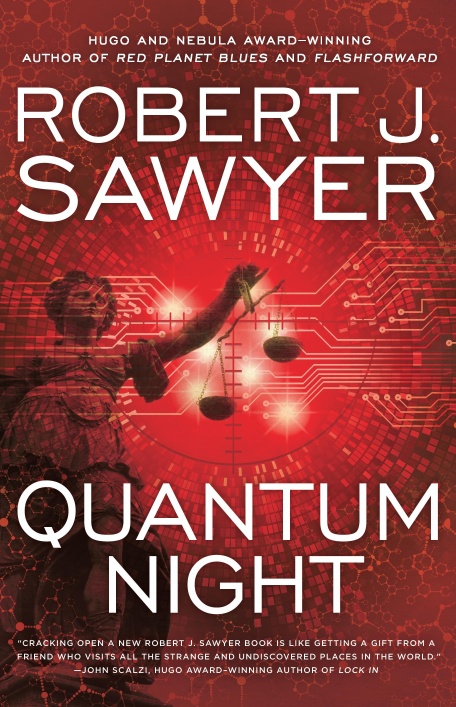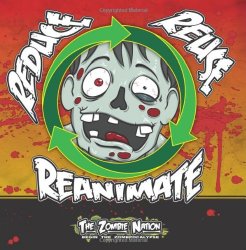(1) END OF PERIOD. As John Hertz said in his report on the dedication of Forrest J Ackerman Square, the city promised to replace the original sign with the erroneous period after the initial “J” – erroneous, because Forry spelled his name without one. And as you can see in this photo by Robert Kerr, the city has installed the corrected sign above the intersection.
(2) BIG ANNIVERSARY CELEBRATION. Greg Ketter’s Minneapolis bookstore is featured in “Wi12: Busman’s Holiday Possibilities” at Shelf Awareness.
DreamHaven Books & Comics
Since opening on April 1, 1977, DreamHaven Books & Comics has moved 10 times and even had multiple locations open at once. Today it’s located in an approximately 3,300-square-foot storefront at 2301 East 38th street, the store’s home for the last eight and a half years, in a neighborhood around five miles southeast of downtown Minneapolis. According to owner Greg Ketter, despite various changes over the years, DreamHaven’s specialization in science fiction, fantasy, horror and comic books has remained constant. The book inventory is a mix of used and new, with a higher proportion of used, rare and collectible books than in years past; Ketter also carries a great deal of movie and comic memorabilia. One of the store’s centerpieces is a towering model of Robby the Robot from the film Forbidden Planet. Throughout the store other models and statues abound.
DreamHaven is celebrating its 40th anniversary with a party on April 1. Ketter has author appearances and a sale planned for the day, and is working in concert with Once Upon a Crime, a mystery bookstore in Minneapolis celebrating its 30th anniversary this year.
(3) BROUGHT TEARS TO MY EYES. Randy Byers, co-editor of Chunga, has promising news about the progress of his cancer treatment.
Again, the discussion is too technical for me to follow, but it all sounds pretty hopeful, which I assume is why Dr. Taylor was willing to be so optimistic right to my face. I feel torn between wild optimism on my own part and cautious skepticism. No doubt I’ll need to read and discuss it further, but damn if I didn’t immediately start thinking, “Maybe I *will* get to see Celine grow up!”
(4) INCONSTANT MOON. A little birdie told us that Larry Niven’s award-winning story may be filmed — “’Arrival’ Producer Developing ‘Inconstant Moon’ Sci-Fi Movie for Fox”.
Fox 2000 is launching development on a movie based on Larry Niven’s science-fiction story “Inconstant Moon” with Oscar-nominated “Arrival” producer Shawn Levy and his 21 Laps company on board.
“The Specatcular Now” director James Ponsoldt is attached from a script by Daniel Casey. Levy and 21 Laps’ Dan Cohen will produce along with Ponsoldt through his 1978 Pictures company and Vince Gerardis through his Created By company.
“Inconstant Moon,” which first appeared in the 1971 short story collection “All the Myriad Ways,” begins with the moon glowing much brighter than ever before, leading the narrator to presume that the sun has gone nova and that this is the last night of his life. He spends the night with his girlfriend but then discovers that the reality is that the Earth has been hit by massive solar flare that kills most the inhabitants of the Eastern Hemisphere.
Levy received an Oscar nomination Tuesday for producing “Arrival” along with Dan Levine, Aaron Ryder and David Linde. “Arrival” was nominated for eight Oscars, including Best Picture and Best Director for Denis Villeneuve.
(5) A REALLY BAD MAN. Atlas Obscura reminds us about a forgotten fictional character who had a major influence on genre fiction over the years: “The Criminal History of Fant?mas, France’s Favorite Fictional Villain”.
As villains go, Fantômas is a nasty one. Created in 1911, he is a gentleman criminal who perpetrates gruesome, elaborate crimes with no clear motivation. He hangs a victim inside a church bell so that when it rings blood rains on the congregation below. He attempts to kill Juve, the detective on his trail, by trapping the man in a room that slowly fills with sand. He skins a victim and makes gloves from the dead man’s hands in order to leave the corpse’s fingerprints all over the scene of a new crime.
His creators called him the “Genius of Evil” and the “Lord of Terror,” but he remained a cipher with so many identities that often only Jove would recognize him. The book that first introduces him begins with a voice asking: Who is Fantômas?
(6) TODAY IN HISTORY
- January 26, 1934 — One of America’s best-loved movie projects gets underway as producer Samuel Goldwyn buys the film rights to The Wizard of Oz.
(7) FAUX FACTS FOR SALE. Chuck Tingle’s Buttbart has opened an Alternative Fact Warehouse where you can purchase such alternative facts as “JOM HAMM IS YOUR HANDSOME ONLINE BUD WHO LIKES TO SKYPE” for a few dollars, with the proceeds going to Planned Parenthood.
GET YOUR FACTS HERE! 100 PERCENT FACT BASED ALTERNATE FACTS FROM THE DEEPEST TIMELINES FOR YOUR HARDEST BUDS https://t.co/8FtqllWdrd pic.twitter.com/yV1qyCnqqj
— Chuck Tingle (@ChuckTingle) January 24, 2017
(8) HE SAID ILK. Milo is scheduled to speak at UC Berkeley on February 1. He was prevented by protestors from speaking at another UC campus a few weeks ago. UC Berkeley Chancellor Nicholas Dirks has issued a statement reminding the university community that theirs is the home of the Free Speech Movement.
Mr. Yiannopoulos is not the first of his ilk to speak at Berkeley and he will not be the last. In our view, Mr. Yiannopoulos is a troll and provocateur who uses odious behavior in part to “entertain,” but also to deflect any serious engagement with ideas. He has been widely and rightly condemned for engaging in hate speech directed at a wide range of groups and individuals, as well as for disparaging and ridiculing individual audience members, particularly members of the LGBTQ community….
Berkeley is the home of the Free Speech Movement, and the commitment to free expression is embedded in our Principles of Community as the commitment “to ensur(e) freedom of expression and dialogue that elicits the full spectrum of views held by our varied communities.” As a campus administration, we have honored this principle by defending the right of community members who abide by our campus rules to express a wide range of often-conflicting points of view. We have gone so far as to defend in court the constitutional rights of students of all political persuasions to engage in unpopular expression on campus. Moreover, we are defending the right to free expression at an historic moment for our nation, when this right is once again of paramount importance. In this context, we cannot afford to undermine those rights, and feel a need to make a spirited defense of the principle of tolerance, even when it means we tolerate that which may appear to us as intolerant.
As part of the defense of this crucial right, we have treated the [Berkeley College Republicans’] efforts to hold the Yiannopoulos event exactly as we would that of any other student group. Since the event was announced, staff from our Student Affairs office, as well as officers from the University of California Police Department (UCPD), have worked, as per policy and standard practice, with the BCR to ensure the event goes as planned, and to provide for the safety and security of those who attend, as well as those who will choose to protest Yiannopoulos’s appearance in a lawful manner.
(9) EARLY WARNING. Declan Finn, in “Live and Let Bite, Best Horror at the Dragon Awards”, shows a photo of a Dragon Award trophy and declares —
In 2017, I’m going to be getting one of these.
Nice, huh? They look nifty, right? Here, let’s pull back a bit.
Yeah, I’m pretty much going to lay my cards on the table and say this is going to win the second annual Dragon Awards in 2017. This is not actually a boast. It’s just logical. No, seriously. Follow me around the windmills of my mind. Live and Let Bite is everything you loved in Honor at Stake and Murphy’s Law of Vampires, and then doubles down.
(10) THE MAGIC NUMBER. Dan Koboldt gives “5 Reasons to Vote for the Hugo Awards”.
2. Expose Yourself to Other Forms of SF/F
Most of us read enough novels to know how we want to vote in that category. Novels and series are the bread-and-butter of the SF/F genre. Furthermore, after the commercial success of Game of Thrones, Westworld, and other franchises, there are arguably more people reading SF/F novels than ever before. Thousand of people vote for the “best novel” Hugo Award.
I wish we could say the same about short stories, novelettes, and novellas.
Short fiction is a critical form of SF/F literature, and indeed is how many of us learned how to write. There are some wonderful markets that publish it — Clarkesworld, Galaxy’s Edge, and Nature, just to name a few — but the readership is much, much smaller. The Hugo Awards are a great opportunity to discover, read, and reward outstanding works in these briefer formats.
(11) AN ICE TOUR. Val and Ron Ontell are organizing pre- and post-Worldcon tours designed for those heading to Helsinki. Before the con there is a tour of Scandinavia, Talinn and St. Petersburg, and afterwards a tour of Iceland. Itineraries for both are at the site.
(12) FISHING WITH BAIT. John Joseph Adams has posted Hugo-eligible items and from Lightspeed, Nightmare and anthologies, and is offering to e-mail additional material to Hugo nominators with proof of voting eligibility.
If you are planning and eligible to vote for the Hugos this year, if you email me proof of your Worldcon membership (i.e., your name is listed on the Worldcon website as an attending member, or the email confirmation or receipt you received when you purchased your membership, etc.) I would be happy to make some additional 2016 material I edited available to you in digital format.
(13) ANOTHER FISHERMAN. Jameson Quinn wrote in a comment here today —
The paper on E Pluribus Hugo by Bruce Schneier and I had made it through peer review when the journal that had accepted it (Voting Matters) suddenly lost its funding and retroactively folded. We were trying to pressure the editor who had accepted it to help us find another place for it, but it looks as if that’s not happening. We’re still planning to publish it in another journal, but sadly we’ll probably have to repeat the whole peer review process. However, it is our belief that the paper is still eligible to be nominated for Best Related Work.
(14) TICKY. The Science and Security Board of the Bulletin of the Atomic Scientists make it out to be two-and-a-half minutes til Midnight — “Doomsday Click Moves Closer to Midnight, Signaling Concern Among Scientists” in the New York Times.
Ms. Bronson, in a post-announcement interview, explained why the board had included the 30-second mark in the measurement. She said that it was an attention-catching signal that was meant to acknowledge “what a dangerous moment we’re in, and how important it is for people to take note.”
“We’re so concerned about the rhetoric, and the lack of respect for expertise, that we moved it 30 seconds,” she said. “Rather than create panic, we’re hoping that this drives action.”
In an op-ed for The New York Times, Dr. Titley and Dr. Krauss elaborated on their concerns, citing the increasing threats of nuclear weapons and climate change, as well as President Trump’s pledges to impede what they see as progress on both fronts, as reasons for moving the clock closer to midnight.
“Never before has the Bulletin decided to advance the clock largely because of the statements of a single person,” they wrote. “But when that person is the new president of the United States, his words matter.”
[Thanks to JJ, Cat Eldridge, Howard Osler, Van Ontell, David K.M.Klaus, Michael J. Walsh, and John King Tarpinian for some of these stories. Title credit goes to File 770 contributing editor of the day Kip W and Yours Truly.]







